
When you get a recommendation for medical marijuana, you may notice it’s not a prescription, which means you cannot fill it at a pharmacy. Medicinal cannabis has a separate designation from prescribed drugs in many states. If you need marijuana, you first must understand the laws in your state governing who can recommend it and why you cannot purchase it at a traditional pharmacy.
Traditional pharmacies where you fill prescriptions from physicians do not fill recommendations for medical marijuana. You will have to go to a dispensary to obtain your medical cannabis — but why? Pharmacies deal with medicine, so why can’t they sell marijuana? The reasons behind this extend into federal law and the licensing of pharmacies. In fact, if pharmacies were to sell cannabis, they would no longer be allowed to sell anything. To preserve their businesses, pharmacy owners have bowed out to allow dispensaries to sell marijuana products in states with legal medicinal cannabis.
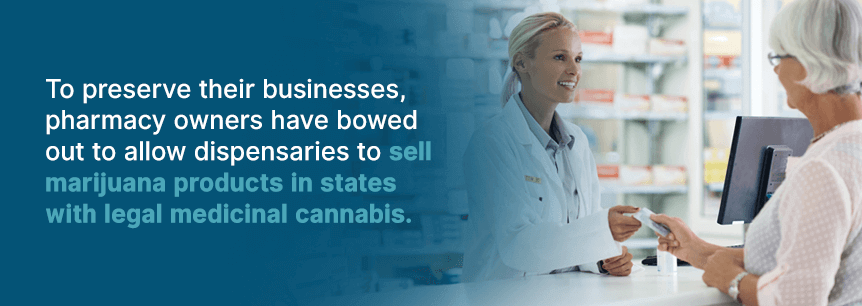
The federal government considers marijuana to be a schedule I controlled substance. According to the DEA, or the Drug Enforcement Agency, drugs with this classification have no medical use and a high likelihood of causing abuse. Other drugs in this classification include LSD, ecstasy and peyote. Although more than half of the states in the U.S. offer legalized medical cannabis, the drug remains a schedule I drug on a national level. Pharmacies must defer to the stricter of the laws, which is the federal, or risk losing their licensing.
The schedule I classification prohibits anyone, including pharmacies, with federal licensing from dispensing it. The law also makes it difficult for scientists to study cannabis medically. Because studies had such strict limits placed on them, it took until the 1990s before scientists could explain how THC works. Both limitations make marijuana only available from dispensaries in a handful of forms.
While federal law prevents the nation-wide sale of medical marijuana, court cases have upheld the rights of states that have legalized it while protecting facilities that sell it. Rulings have included those that allow doctors to recommend weed and to require insurance companies to cover marijuana businesses if the policies included coverage.
In 2002, a Court of Appeals allowed for doctors to recommend medical marijuana in the Conant v. Walters case. This case protected doctors from having their licenses revoked for recommending cannabis. Without this ruling, doctors would have feared for their jobs if they became certified marijuana doctors. Today, doctors carrying this certification do not have to worry about their careers because they chose to recommend cannabis.
In 2016, the District of Colorado ruled in Green Earth Wellness LLC v. Atain Specialty Insurance Company that an insurance company still had to pay out on a policy created to cover a cannabis business. This ruling could improve the plight of pharmacists and others working at dispensaries who need business insurance.
As a schedule I drug, marijuana poses difficulties for medicine developers and researchers. Because obtaining and studying marijuana in the United States is so tricky, researchers have yet to isolate the active ingredients from cannabis to create a potent, dose-based medicine that pharmacies can sell. Both the cost and the legal barriers prevent more research from taking place. In the United States, to develop a new drug, the price tag can reach $2.5 billion.
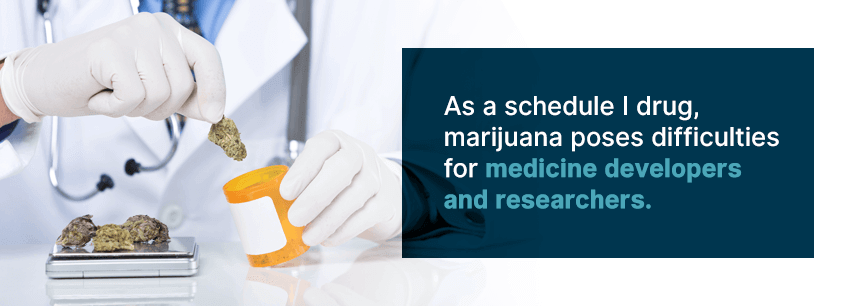
Currently, patients who want the benefits of marijuana will seek out forms of the plant from a dispensary, rather than taking a pill with the active compounds isolated. American law does not allow for putting a patent on natural plants, like marijuana. While not having a patent on cannabis means dispensaries can offer it without the high cost of a brand name, it also means there is little regulation of marijuana plants. Certain varieties have more THC, which creates the psychoactive effects. Without proper labeling of the plants, patients at a dispensary will not know which type to choose.
The lack of studies poses another potential concern for patients. When you go to a traditional pharmacy for medicine, you get a dose your doctor specifies with a set amount of the active ingredient. Because marijuana is a natural plant, growing conditions and strains can cause variations in the active ingredients, making it more difficult to accurately measure the exact amount needed.
Because marijuana doses don’t have standard measurements across products, patients may require some trial-and-error to arrive at the right dose and strain. Dispensary employees can help during this process. The trial-and-error process is not unique to marijuana, however. Traditional drugs may often require many tries before a patient and their doctor identify the right one from a class of medicine, such as pain relievers or antidepressants.
Because the DEA registers pharmacies, they would break the law if they provided patients with cannabis. A pharmacist in violation of the law could potentially cause the pharmacy to lose its license, even if the location is in a state with legalized medical marijuana. A pharmacy cannot operate without its DEA license to dispense regulated drugs.
That means you cannot get marijuana at pharmacies because it would cause the pharmacist to break the law, resulting in the subsequent closure of the pharmacy. Though lawmakers in states with legal medicinal marijuana want to change this law, currently, you must visit a state-approved dispensary for your cannabis — though you may still speak with a pharmacist at a dispensary in some states.
To make matters more complicated are the state laws in five states governing the dispensing of cannabis requiring the involvement of pharmacists. While pharmacies cannot sell marijuana, five states require pharmacists to be involved in cannabis sales for medicinal purposes. The jobs of the pharmacists in dispensaries depend on the state. For instance, when you visit a dispensary in Connecticut, you will see a pharmacist there because they are the only ones who can operate such places. In New York and Minnesota, dispensaries have pharmacists on hand for consultations and dispensing.
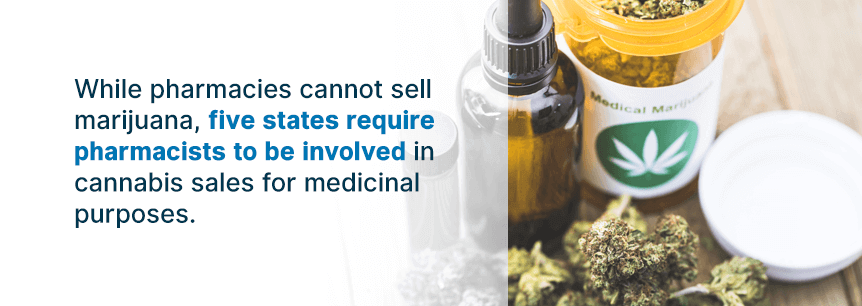
These laws can make patients feel safer concerning the medical advice they receive from dispensaries in these states. However, the pharmacists themselves lack the professional insurance they need to protect their business due to the dearth of traditional insurers for marijuana providers. Because medical marijuana still carries a stigma in the healthcare industry, pharmacists working at dispensaries cannot obtain malpractice insurance. While this will not affect patient care and experiences, it may make it harder for pharmacists to work at dispensaries.
Patients may feel safer talking about their medicine with a pharmacist at a dispensary, but the pharmacist selling marijuana needs to take precautions to avoid issues with the law. Some dispensaries may offer aid in protecting the pharmacist from a malpractice lawsuit, but concerned pharmacists should discuss the matter with a lawyer familiar with the state laws and malpractice suits.
Having pharmacists operate dispensaries does not mean all patients get the same care across the states that have this requirement, either. Depending on the state, pharmacists in dispensaries could have very different roles. Take, for instance, the dramatic differences in the dispensaries and their operators in New York and New Jersey.
Both states require pharmacists to consult with patients and dispense marijuana. In New York State, cannabis comes in minimal forms with varieties allocated based on the ratios of THC and CBD. To prepare for their stints in dispensaries, pharmacists in New York State must take a four-hour specialty course. The state also requires pharmacists to maintain extensive records of those who visit the dispensary.
In New Jersey, pharmacists receive no other training before taking over at a dispensary. The pharmacists must learn the names of esoterically dubbed strains with non-scientific titles such as “Nigerian Haze” and “Dream Police.” The varieties do not have percentages of THC and CBD labeled on them. Thankfully, the lackadaisical method pharmacists in New Jersey dispensaries treat patients with will soon change with pending requirements for state dispensaries.
One of the benefits of having pharmacists at dispensaries is the level of data collection and scientific investigation involved. Pharmacists, with their science backgrounds, learn which types of cannabis work best for certain conditions. As they learn, they become more adept at preparing the best form of the medicine for their dispensary customers. For instance, pharmacists operating at dispensaries share information about cannabis types, forms, and effectiveness for their patients. This shared data allows them to conduct their research on marijuana’s side effects, drug interactions, and efficacy. With greater knowledge, the pharmacists are better able to cater to their patients’ needs at the dispensary.
To avoid interactions with other medications you’re taking, always tell both the dispensary and your marijuana-recommending doctor everything you’re currently using. This listing of medicines should also include any herbal or natural supplements and legal or illegal recreational drugs. The listing of medications will help your doctor to avoid interactions when recommending marijuana to you. Pharmacists working at dispensaries are working to gather more data about interactions to protect patients in the future.
Even traditional pharmacists are learning more about marijuana and its interactions. The Pharmacy Times released a video to promote the ongoing education of pharmacists about cannabis. Because more pharmacists engage in continuous education courses to further their learning about all drugs, including marijuana, they will likely be able to answer your questions about interactions and more with medical marijuana. You can ask about potential negative drug interactions from your pharmacist when you go pick up your traditional prescriptions or if you have a pharmacist working at your dispensary.
If you live in a state that does not require pharmacists at dispensaries, you will not meet with a pharmacist. Instead, it will be with an employee of the dispensary who may not hold special certification. Because dispensary employees may not know specifically about your condition, talk to your marijuana-certified doctor about specific forms or strains you need to look for when at the pharmacy.
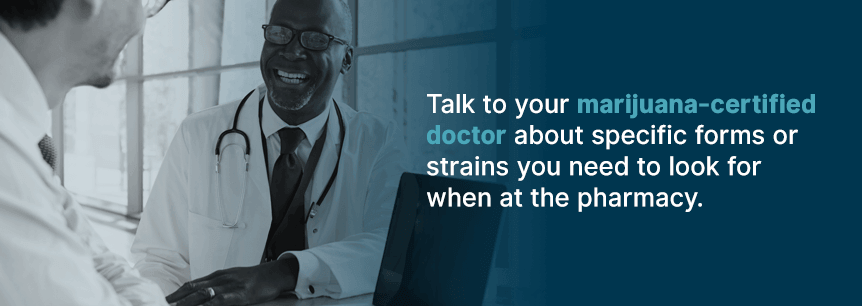
In today’s current society, pharmacies and medical marijuana don’t mix. Pharmacies cannot sell marijuana, but dispensaries can. So why can patients go to a dispensary legally but not a pharmacy? The licensing makes the difference. In states with legalized medical marijuana, the state, not the DEA, licenses dispensaries. Because they do not have DEA licensing to lose, marijuana dispensaries can sell cannabis legally.
You cannot just walk into a dispensary in a state that only allows legal medicinal marijuana, though. In all places with legalized medical cannabis, you must follow a process to get your treatment. First, you must obtain a recommendation from a qualified physician. After your doctor has approved you for use, you must purchase a medical marijuana card to indicate you are allowed to buy medicinal cannabis. This card does more than merely give the state more money from the processing fee. Without this card, if you are pulled over by law enforcement and you have marijuana in your vehicle or on your person, you could be arrested on a possession charge.
With your card in hand, you may now shop for cannabis from your nearest dispensary. At a dispensary, you will meet with an employee, sometimes called a budtender, who will help you choose the marijuana for your condition. Depending on your state, you may find cannabis in many forms, buds, oils, edibles and more. Some states, like New York, do not allow the sale of inhaled forms of marijuana, while others require a physician to specify a strain of cannabis you can purchase from a dispensary.
Though legal in many states, you will need to follow a strict process to get cannabis for your condition. Start by finding a doctor your state has certified to recommend medicinal marijuana. You will discuss your health with your doctor, who will decide if cannabis can help you feel better. If they believe you will get more help from medicinal marijuana than you will feel adverse effects, you will likely get a recommendation for cannabis. Some states require the doctor to specify a form of the medicine. Other states may ask you to get an identification card that allows only you — rather than a family member or someone else — to purchase marijuana. Be sure to follow your state’s requirements for obtaining medical cannabis.
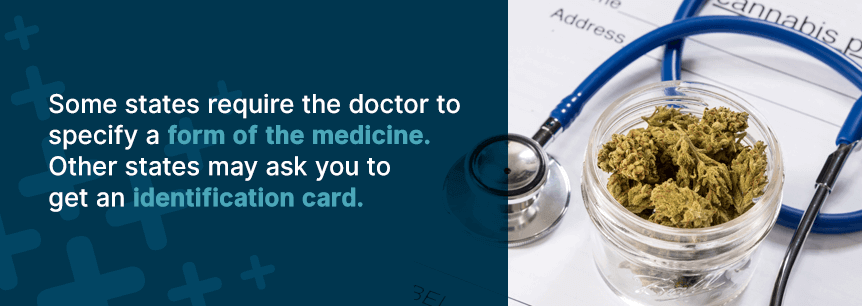
Once you get a recommendation for marijuana from a qualified doctor, you will need to find a dispensary to fill your needs. At the dispensary, you can get questions answered about the many forms of marijuana available. In this regard, dispensaries are similar to pharmacies because those who work at both can answer your queries about the products they sell. As with any medical concern, always talk to your doctor about your specific condition. But if you know you need marijuana, you can start your search for a dispensary.
Find A Doctor Find A Dispensary
No Information on MarijuanaDoctors.Com should be used to diagnose, treat, prevent or cure any disease or condition. You can view our Full Disclaimer here.